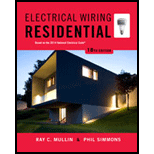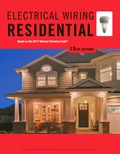
Electrical Wiring Residential
18th Edition
ISBN: 9781285170954
Author: Ray C. Mullin, Phil Simmons
Publisher: Cengage Learning
expand_more
expand_more
format_list_bulleted
Textbook Question
Chapter 1, Problem 24R
A junction box on a piece of European equipment is marked 200 cm3. Convert this to cubic inches. _________________________________
Expert Solution & Answer
Trending nowThis is a popular solution!

Students have asked these similar questions
Calculate the mesh currents, find Ia, Ib, Ic. Apply mesh analysis
Find Va and Vb using Nodal analysis
4. A battery operated sensor transmits to a receiver that is plugged in to a power outlet. The device is
continuously operated. The battery is a 3.6 V coin-cell battery with a 245mAHr capacity.
The application requires a bit rate of 36 Mbps and an error rate of less than 10^-3. The channel has a
center frequency of 2.4 GHz, a bandwidth of 10 MHz and a noise power spectral density of 10^-14
W/Hz. The maximum distance is 36 meters and the losses in the channel attenuates the signal by 0.25
dB/meter.
Your company has two families of chips that you can use. An M-ary ASK and an M-ary QAM chip. The
have very different power requirements as shown in the table below.
The total current for the system is the current required to achieve the desired Eb/No PLUS the current
identified below:
Hokies PSK Chip Set Operating Current NOT Including
the required Eb/No for the application
Hokies QAM Chip Set Operating Current NOT Including
the required Eb/No for the application
Chip ID
M-ary
Voltage (volts)…
Chapter 1 Solutions
Electrical Wiring Residential
Ch. 1 - What is the purpose of specifications?Ch. 1 - Refer to the specifications in the back of this...Ch. 1 - What is done to prevent a plan from becoming...Ch. 1 - Name three requirements contained in the...Ch. 1 - Prob. 5RCh. 1 - What phrase is used when a substitution is...Ch. 1 - What is the purpose of an electrical symbol?...Ch. 1 - Prob. 8RCh. 1 - Prob. 9RCh. 1 - What three parties must be satisfied with the...
Ch. 1 - Prob. 12RCh. 1 - Prob. 13RCh. 1 - Does the NEC provide minimum or maximum standards?...Ch. 1 - What do the letters UL signify?Ch. 1 - What section of the NEC states that all listed or...Ch. 1 - Prob. 17RCh. 1 - Prob. 18RCh. 1 - Does compliance with the NEC always result in an...Ch. 1 - Name two nationally recognized testing...Ch. 1 - Prob. 21RCh. 1 - Prob. 23RCh. 1 - A junction box on a piece of European equipment is...Ch. 1 - Prob. 25RCh. 1 - You will learn in Chapter 3 that residential...Ch. 1 - Prob. 27RCh. 1 - What can you do to reduce or eliminate the...Ch. 1 - What is the NEC definition of a qualified person?Ch. 1 - Are low-voltage systems totally safe? Explain.Ch. 1 - Prob. 32RCh. 1 - What do the letters PPE stand for?...Ch. 1 - Prob. 34RCh. 1 - Where might you obtain information about...Ch. 1 - Prob. 36R
Knowledge Booster
Learn more about
Need a deep-dive on the concept behind this application? Look no further. Learn more about this topic, electrical-engineering and related others by exploring similar questions and additional content below.Similar questions
- Using the 802.11a specifications given below, in Matlab (or similar tool) create the time domain signal for one OFDM symbol using QPSK modulation. See attached plot for the QPSK constellation. Your results should include the power measure in the time and frequency domain and comment on those results. BW 802.11a OFDM PHY Parameters 20 MHZ OBW Subcarrer Spacing Information Rate Modulation Coding Rate Total Subcarriers Data Subcarriers Pilot Subcarriers DC Subcarrier 16.6 MHZ 312.5 Khz (20MHz/64 Pt FFT) 6/9/12/18/24/36/48/54 Mbits/s BPSK, QPSK, 16QAM, 64QAM 1/2, 2/3, 3/4 52 (Freq Index -26 to +26) 48 4 (-21, -7, +7, +21) *Always BPSK Null (0 subcarrier) 52 subarriers -7 (48 Data, 4 Pilot (BPSK), 1 Null) -26 -21 0 7 21 +26 14 One Subcarrier 1 OFDM symbol 1 OFDM Burst -OBW 16.6 MHz BW 20 MHZ 1 constellation point = 52 subcarriers = one or more OFDM symbols 802.11a OFDM Physical Parameters Show signal at this point x bits do Serial Data d₁ S₁ Serial-to- Input Signal Parallel Converter IFFT…arrow_forwardFind Vb and Va using Mesh analysisarrow_forward1. The communication channel bandwidth is 25 MHz centered at 1GHz and has a noise power spectral density of 10^-9 W/Hz. The channel loss between the transmitter and receiver is 25dB. The application requires a bit rate of 200Mbps and BER of less than 10^-4. Excluding Mary FSK, Determine the minimum transmit power required.arrow_forward
- 2. An existing system uses noncoherent BASK. The application requires a BER of <10^-5. The current transmit power is 25 Watts. If the system changes to a coherent BPSK modulation scheme, what is the new transmit power required to deliver the same BER?arrow_forward3. You are to design a 9-volt battery operated communication system that must last 3 years without replacing batteries. The communication channel bandwidth is 100 KHz centered at 5.8 GHz. The application requires a BER of <10^-5 and a data rate of 1 Mbps. The channel can be modeled as AWGN with a noise power spectral density of 10^-8 W/Hz. ((a) What modulation scheme would you use? B) what is the required capacity of the batteries? and (c) is the battery commercially available?arrow_forwardDesign a traffic light PIC microcontroller program with Green LED has 3 Sec Yellow LED has 0.5 Sec Red LED has 3 Sec RASAN4SSC20UT 8 RBOINT RB1 9 RB2 U1 PIC16F877A-I/PT 18 19 MCLRVPP RAOANO 20 RA1AN1 30 OSCICLKI 21 RAZAN2VREF-CVREF 31 OSC2CLKO RABAN3VREF+ 22 LED1 LED-3MM 〃 R1 330 RA4TOCKIC1OUT 23 7 VDD 28 VDD 6 VSS 29 VSS 24 LED2 LED-3MM R2 10 330 RB3PGM 11 + 14 RB4 38 RDOPSPO RB5 15 LED3 39 RD1PSP1 40 RD2PSP2 RB6PGC- RB7PGD 17 16 LED-3MM R3 330 41 RD3PSP3 2 RD4PSP4 RCOT1OSOTICKK 3 RDSPSPS RC1T10SICCP24 RD6PSP6 RC2CCP1 5 RD7PSP7 RC3SCKSCL RC4SDISDA 25 REORDANS RCSSDO 27 29 REIWRANG RC6TXCK- RE2CSAN7 RC7RXDT DAWWWW 32 35 36 37 42 43 44 1 12 NO 13 NC 33 NO 34 NCarrow_forward
- : +0 العنوان I need a detailed drawing with explanation しじ ined sove in peaper Anoting Q4// Draw and Evaluate √√√xy-²sin(y²)dydx PU+96er Lake Ge Q3// Find the volume of the region between the cylinder 2 = y² and the xy- plane that is bounded by the planes x = 1, x = 2, y = -2, and y = 2. T Marrow_forwardFind Va and Vb using Mesh analysisarrow_forwardFind Va and Vb using Nodal analysisarrow_forward
- Please solve this question step by step and handwritten and do not use chat gpt or ai tools thank you very much!arrow_forwardWhat are the four conditions that must be met before a generator is connected to a 3 phase system?arrow_forwardPlease solve this question step by step and handwritten and do not use chat gpt or ai tools thank you very much!arrow_forward
arrow_back_ios
SEE MORE QUESTIONS
arrow_forward_ios
Recommended textbooks for you
 EBK ELECTRICAL WIRING RESIDENTIALElectrical EngineeringISBN:9781337516549Author:SimmonsPublisher:CENGAGE LEARNING - CONSIGNMENT
EBK ELECTRICAL WIRING RESIDENTIALElectrical EngineeringISBN:9781337516549Author:SimmonsPublisher:CENGAGE LEARNING - CONSIGNMENT

EBK ELECTRICAL WIRING RESIDENTIAL
Electrical Engineering
ISBN:9781337516549
Author:Simmons
Publisher:CENGAGE LEARNING - CONSIGNMENT
Types of Protective Relays and Design Requirements, Part 1a.; Author: GeneralPAC: Power System Tutorials;https://www.youtube.com/watch?v=JYil4T5VSDM;License: Standard Youtube License